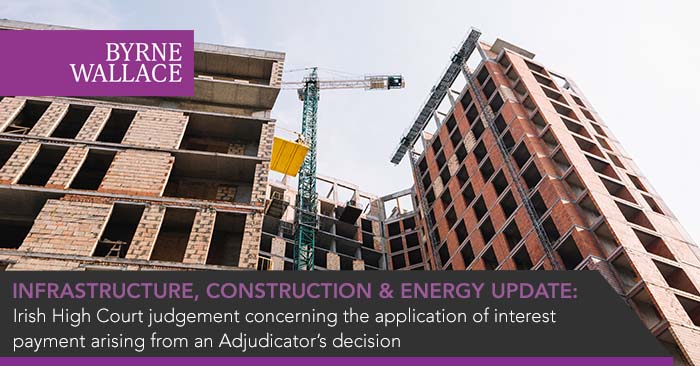Irish High Court judgement concerning the application of interest payment arising from an Adjudicator’s decision
Friday, 20 December 2024
On the 17 December 2024, the High Court in enforcing an Adjudicator’s decision under the Construction Contracts Act 2013 (the “Act”) delivered an ex tempore judgement, which states that where a mechanism for the calculation of interest is included in an Adjudicator’s decision, the relevant basis of calculation can apply beyond the conclusion of enforcement proceedings.
Background
ByrneWallace LLP acted for the Applicant in the matter of Finnegan Contracts v Killycard Developments1 concerning the enforcement of an Adjudicator’s decision in relation to payments owed to the Applicant under to a ‘construction contract’, as defined by the Act.
The underlying Adjudicator’s decision required the Respondent to make three payments – firstly, an amount adjudged by the Adjudicator to be owing to the Applicant for works completed pursuant to the construction contract, secondly, the Adjudicator’s fees, and finally, the interest accruing from the late payment of the disputed amount. The Adjudicator calculated the accrual of interest at a daily rate commencing from 7 days after the latest payment and running until payment was made.
The established position when the Court makes an order involving the payment of an adjudicator’s award is that late payment interest will apply at the rate specified by section 26 of the Debtors (Ireland) Act 1840. This meant that the interest payment mechanism (if any) set out by an Adjudicator’s decision would accordingly be displaced by the mechanism prescribed by the Debtors (Ireland) Act upon the enforcement of the decision by the High Court.
Legal Arguments
The Applicant sought orders for the payment of all three amounts specified by the Adjudicator in their decision, therefore seeking interest calculable at the rate specified by the Adjudicator. Mr Justice Simons queried the proposed order as to interest and explained the usual application of the Debtors (Ireland) Act in displacing the mechanism applied by an earlier decision-maker. Counsel for the Applicant submitted that if the Court were to enforce the Adjudicator’s decision, which expressly made provision for the applicable interest rate for late payment, then that stipulated rate of interest should be enforced in conjunction with the substantive decision. Counsel for the Applicant opined that this principle was one that underlined the effectiveness of Adjudication and the Courts’ role in relation to the statutory regime.
It is important to reflect that Counsel for the Respondent opposed the application of the rate of interest detailed in the Adjudicator’s decision beyond the enforcement proceedings and informed the Court that this would be a novel position. Respondent Counsel declined however to adjourn the hearing to make submissions on this particular point.
Decision
In enforcing the Adjudicator’s decision, Mr Justice Simons additionally decided to uphold the interest mechanism applied by the Adjudicator. Giving his decision orally, Mr Justice Simons acknowledged that the High Court had not previously enforced an Adjudicator’s interest mechanism as part of the enforcement and that previously the regime under the Debtors (Ireland) Act would apply from the time of the Court’s judgement.
In this matter, Mr Simons J. said that the Adjudicator has expressed the interest mechanism, that the Court should give effect to that rate, and that it best respect the rationale of the statutory regime to give full effect to it. Lastly, Mr Simons J. pointed to a comparison with contract law in general and the example of a mortgage, containing a contractual interest rate and how such rate would continue to apply in lieu of the provisions of the Debtors (Ireland) Act.
Conclusion
Though this represents a narrow precedent in future Adjudication enforcement proceedings, it should be noted that this approach remains substantially untested. Despite this, the Court’s deference to the authority of an Adjudicator on the issue of what rate of interest is to be applied is a discrete legal development that helps refine the parameters of adjudication under the Act and the enforcement of Adjudicators’ decisions in Ireland.
ByrneWallace LLP acted for the Applicant in this case. For assistance with Adjudication construction and infrastructure matters, please contact Martin Cooney or Andrew McVea of the ByrneWallace LLP Infrastructure, Construction and Energy Group, or your usual ByrneWallace LLP contact. Authors include Michael Conaty and Conor Henry.1 Finnegan Contracts Limited v Killycard Developments Limited, 2024/550/MCA

